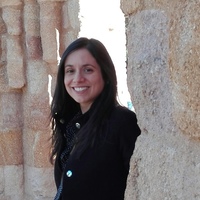- Universidad Complutense de Madrid, Filosofía Teorética, Faculty Memberadd
Research Interests:
Research Interests:
Research Interests:
Research Interests:
En Gérard Lebrun philosophe. Dir. Michèle Cohen-Halimi, Vinicius de Figueiredo, Nuria Sánchez Madrid (Beauchesne)
Research Interests:
En José Luis Pardo y Marco Díaz Marsá (eds.), Foucault y la cuestión del derecho (Escolar y Mayo)
Research Interests:
Research Interests:
The body, its materiality, and the images through which we apprehend them have been a constant concern in Adriana Cavarero's philosophy. The contention of this paper is that her work on this topic lays out the foundations for (1) an... more
The body, its materiality, and the images through which we apprehend them have been a constant concern in Adriana Cavarero's philosophy. The contention of this paper is that her work on this topic lays out the foundations for (1) an understanding of the relationship between the imaginary and the corporeal as one of entanglement and inseparability; and (2) responding to the questions of what an image and a body can do. To develop this, this paper focuses on two texts, Stately Bodies and Inclinations, that provide, respectively, (1) an account of the assemblages and frictions between images and bodies through an analysis of the metaphor of the body politic in Western thought; and (2) an ontology of bodily images. Although both texts critically engage with Western hegemonic images of the body, I argue that the presence of the body as a powerful physical givenness articulates the narrative of Stately Bodies, while Inclinations is rather focused on the capacity of images to constitute different subjects and different worlds. These two perspectives are complementary rather than contradictory. Reading them together allows for the distillation
Critique has been recently accused of not being able to respond to the challenges of our times, such as the climate emergency and the pandemic crisis. The new materialisms, which have posited themselves as a corrective to critique's... more
Critique has been recently accused of not being able to respond to the challenges of our times, such as the climate emergency and the pandemic crisis. The new materialisms, which have posited themselves as a corrective to critique's alleged overinflation of culture and language by proposing a (re)turn to matter, affirm that ours is a post-critical era. Against this diagnosis, the aim of this paper is to defend both the importance of critique for our current conjuncture and the need to rethink what it involves. Drawing from the work of Foucault, Deleuze, and Butler, I develop a specific but multidimensional understanding of critique that combats the vagueness and inconsistencies surrounding many post-critical approaches to this notion. Specifically, I suggest that critique entails (1) an enquiry into the conditions that structure, organise, and determine what can and cannot be perceived, experienced, and thought; (2) a clinical diagnosis or symptomatology of our present; (3) a political exercise of freedom; and (4) a practice of care. I conclude by showing how this conception of critique helps us to understand different dimensions of the Covid pandemic that might otherwise be ignored.
Research Interests:
Through an engagement with the notions of metapsychology and the death drive as presented in Beyond the Pleasure Principle, this paper explores the significance and different dimensions of Freud’s trope of the ‘beyond’. Against readings... more
Through an engagement with the notions of metapsychology and the death drive as presented in Beyond the Pleasure Principle, this paper explores the significance and different dimensions of Freud’s trope of the ‘beyond’. Against readings that reduce it to a questioning of the dominance of the pleasure principle and the introduction of an opposing principle, the death drive, I propose to understand the ‘beyond’ as (1) the transcendental condition of possibility of psychic life and (2) the occasion to articulate a critique of violence, where violence is understood to entail the foreclosure or erasure of the ‘beyond’.
Research Interests:
The controversy over humanism in the second half of the twentieth century seemed to promote an irreversible abandonment of the concept of the human, famously illustrated by Foucault's image of the face sketched in the sand at the seashore... more
The controversy over humanism in the second half of the twentieth century seemed to promote an irreversible abandonment of the concept of the human, famously illustrated by Foucault's image of the face sketched in the sand at the seashore being erased by the water. In the last two decades, however, a number of philosophers have reassessed and returned to a certain notion of the human all the while incorporating the arguments of the anti-humanist and anti-anthropocentric critiques. Judith Butler and E ´ tienne Balibar are among them. The aim of this article is to explore and compare the particular tropes that both put into play to refigure the human (namely, catachresis in Butler and mis-being in Balibar), and to show how, in light of these tropes, a different reading of Foucault's metaphor emerges; one in which the human is understood as a continuous and tensional process of doing and undoing, of drawing and erasing lines in the sand.
